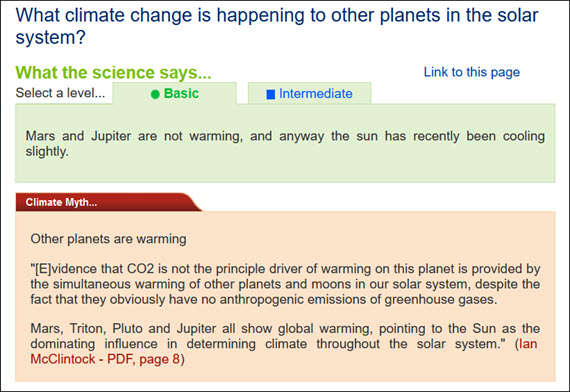On February 14, 2023 we announced our Rebuttal Update Project. This included an ask for feedback about the added "At a glance" section in the updated basic rebuttal versions. This weekly blog post series highlights this new section of one of the updated basic rebuttal versions and serves as a "bump" for our ask. This week features "What climate change is happening to other planets in the solar system?". More will follow in the upcoming weeks. Please follow the Further Reading link at the bottom to read the full rebuttal and to join the discussion in the comment thread there.
At a glance
Experienced students of climate science denial will be familiar with many of the arguments that contrarians use. But every now and then you come across a document so crammed with such talking points that they're like raisins in a Christmas pudding. So it is with the 8-page offering containing the above quote, dating from June 2009.
But 2009 is a long time ago now. So much so that one of the big statements in that document:
"With the Sun now entering a ‘quiet’ phase, it is anticipated that this cooling trend is likely to continue until Sun activity increases."
is self-evidently a complete fail, given that according to NOAA, all of the ten warmest years in a data record stretching back to the late 19th century have been since 2010.
That the document is a complete fail, as evidenced by the above quote, is one thing. But how about the claim that the other planets are warming? This is a weird one, given the impossible expectations demanded of those tasked with recording temperatures here on Earth. Accusations of badly-sited weather stations, data manipulation and similar conspiracy-theories abound out there in various dimly-lit corners of cyberspace. But then you get a document from the same stable that claims Pluto is warming up. What's that based on?
Pluto takes 248 years to complete a single orbit around the Sun. Since the body was discovered in 1930, a simple calculation shows we've had the chance to point our telescopes at it for 37.5% of a Plutonian year, so if the place had four seasons then we've not yet seen half of them.
Apart from remote observations made in 1988 and 2002, we did send the New Horizons NASA spacecraft out there in 2006, to make a flyby of the dwarf planet in 2015. It collected lots of useful data in the process, but three sets of observations over 27 years means just what?
Twenty-seven years is just one ninth of a single year on Pluto. On Earth that would be 40 days. What could you say about the climate from that? Wild and unsubstantiated claims, based on very little data, might fool some people but the advantage these days is that they can be fact-checked and quickly. Nonsensical statements thereby reveal themselves to be just that.
Finally, in the 2009 document, all talking-points converge on a single hypothesis - that the Sun is responsible for the current global warming. Only one problem with that, but it's a huge one. Solar energy output is expressed as 'total Solar irradiance' (TSI) and is easily measured by satellites. Since 1980, TSI and global temperatures have diverged. TSI has decreased by a measurable amount, while the global temperature has continued on its erratic but upwards pathway.
It's not the Sun - it's our cranking out of greenhouse gases in their tens of billions of tonnes every year, on and on and on.
Please use& this form to provide feedback about this new "At a glance" section. Read a more technical version below or dig deeper via the tabs above!
Click for Further details
In case you'd like to explore more of our recently updated rebuttals, here are the links to all of them:
&
If you think that projects like these rebuttal updates are a good idea, please visit our support page to contribute!

Comments